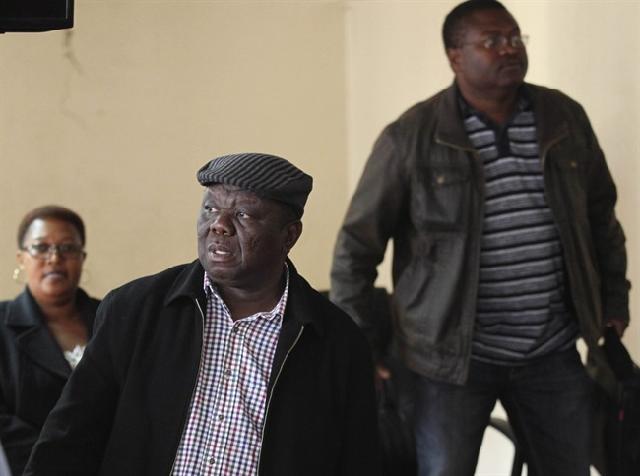Roy Bennett, a leading Zimbabwe opposition figure, has called for a campaign of “passive resistance” after election results showed President Robert Mugabe’s party had won a large majority in parliament.
Roy Bennett, treasurer of the Movement for Democratic Change (MDC), said people should force Robert Mugabe’s Zanu-PF to “rule by themselves”.
The MDC has already said it will not recognize the results, alleging fraud.
It comes as the party holds emergency meetings to discuss the outcome.
The Zimbabwe Electoral Commission (ZEC) earlier said Zanu-PF had won 137 seats in the 210-seat chamber – just short of two-thirds – with most seats declared.
Results in the presidential race have yet to be announced.
PM Morgan Tsvangirai, who heads the MDC and is running for president against Robert Mugabe, has already dismissed the election as “a sham”.
Amid rising tension, UN Secretary General Ban Ki-moon called on President Mugabe and Morgan Tsvangirai to send “clear messages of calm”to their supporters.
His spokesman, Martin Nesirky, said Ban Ki-moon wanted any election disputes to be handled “transparently and fairly”.
The MDC was believed to be holding talks on Friday and Saturday to decide on a response to the results.

Its treasurer Roy Bennett said there should be a wave of social disobedience in order to bring the regime to a halt.
“I’m calling on the people of Zimbabwe, who are our constituents and who we represent in the positions we hold, for passive resistance and for total disengagement,” he said.
“And let Zanu-PF rule and rule by themselves and bring the country to a standstill.”
Morgan Tsvangirai, 61, earlier said the vote was “null and void”.
A local monitoring group has also said that the poll was “seriously compromised”.
The Zimbabwe Election Support Network (ZESN) – the largest group of domestic monitors with some 7,000 people on the ground – said as many as one million people had been unable to cast their ballots.
It said voting irregularities were much more likely to affect urban areas, where support for Morgan Tsvangirai is strong, than in President Robert Mugabe’s rural strongholds.
However, the two main observer groups have broadly endorsed the election, saying it was free and peaceful.
African Union (AU) mission head Olusegun Obasanjo dismissed the complaints of fraud, saying the election was fair and free “from the campaigning point of view”.
He acknowledged incidents “that could have been avoided and even tended to have breached the law” but added: “We do not believe that these incidences [incidents] will amount to the result not representing the will of the people.”
Meanwhile, monitors from the Southern African Development Community (SADC) described the elections as “free and peaceful” but said it was too early to call them fair.
South Africa became the latest country to endorse the result, challenging critics to provide evidence of vote-rigging.
Zanu-PF and the MDC have formed an uneasy coalition government since 2009. That deal ended deadly violence that erupted after a disputed presidential poll the previous year.
Robert Mugabe is running for a seventh term.
If Zanu-PF clinches a two-thirds majority it will be able to change Zimbabwe’s constitution.
Under Zimbabwean law, seven days are set aside for legal challenges with another two days for rulings to be made. After that, the swearing-in of a new government takes place.
[youtube wGTYfbezyv8]
[youtube wjyXgLu5810]
